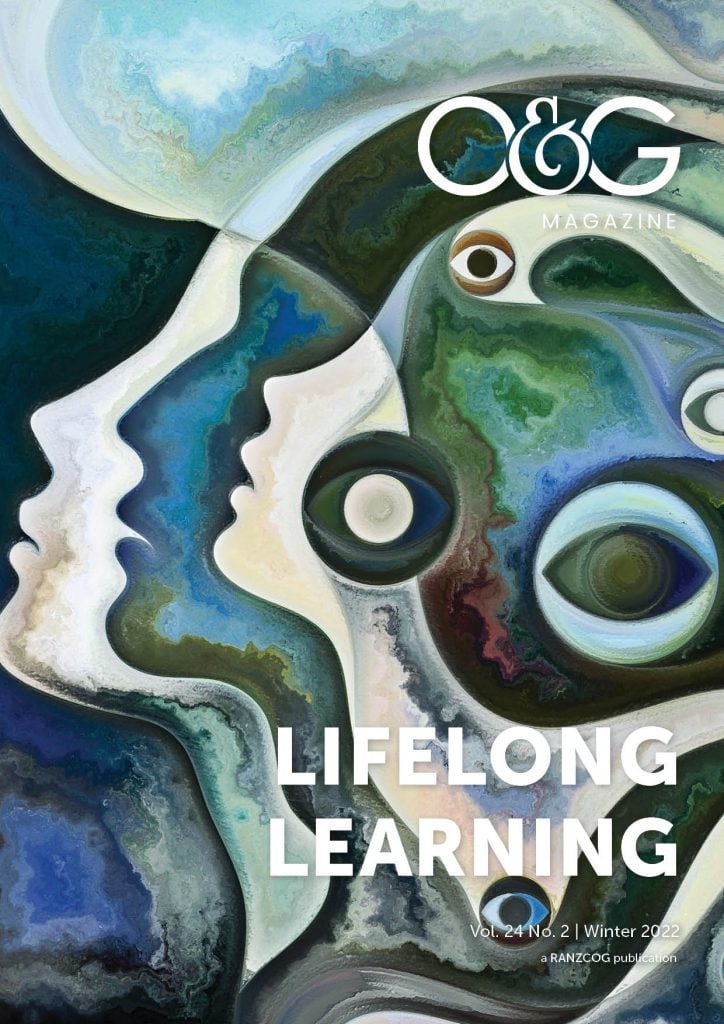Lifelong learning is the ongoing, voluntary and self-directed pursuit of knowledge for either personal or professional reasons. In this issue of O&G Magazine, we concentrate on the professional side, while acknowledging the importance of learning in fields outside this realm. How many of us found new skills or interests during the recent pandemic lockdowns in order to maintain our physical, mental and social wellbeing? Sourdough anyone? Tik Tok dancing?
The principles of acquiring new skills or reinforcing those we already have crossover between the personal and professional. We can not only learn in a formal didactic way but by doing, teaching, reviewing and reflecting, listening to others and giving and receiving feedback. We learn from written, visual and auditory sources, and also from interacting with colleagues, patients and incorporating our own life experiences.
As professionals we are seen as a disciplined group of individuals who ‘adhere to ethical standards and who are accepted by the public as possessing special knowledge and skills in a widely recognised body of learning derived from research, education and training at a high level, and who are prepared to apply this knowledge and exercise these skills in the interest of others.’ (Australian Council of Professions, 2003)
Part of living up to these standards is not only to maintain our skills and knowledge, but to be seen to be doing so. Hence what some may see as the imposed regulation and documentation of CME or CPD. As explained in the article on CPD, The Medical Board of Australia and the Medical Council of New Zealand, Te Kaunihera Rata Aotearoa, will soon dictate how CPD will be structured into the future. The new format and resources developed by RANZCOG have been designed to make the process easier for Fellows and members to comply, and so make it as streamlined as possible to make our College your CPD home.
While we all accept that keeping up to date is imperative, it may be time to look more laterally at how and why we learn. In this issue we discuss some of these theories and hope to inspire you to perhaps branch out and try new approaches. What type of learner are you? What is the importance of psychological safety when giving feedback and interacting in teams?
How can we learn to provide information in a way that best suits our patients? We have two articles from our Consumer Network as part of their ongoing contribution. We should acknowledge the importance of learning from the lived experience of our patients and remember the social determinants of health. We need to understand levels of health literacy and how people use the Internet to explore symptoms and diagnoses.
Learning needs change throughout a career. From the obvious basic clinical skills acquired when entering a training program, to the structured gaining of responsibilities, the subtleties of dealing with complex emotions, the choice of specialised fields or areas of interest and settling into formal ongoing CPD throughout a career.
In mid-career we are often at the peak of our performance but also the most busy, and may not take time to reflect, and as we age we may find it difficult to adapt to new technologies such as paperless hospital record systems. Finally, we need to learn when and how to slow down, accept the limitations of advancing years on our senses and reaction times and perhaps change career direction before eventually retiring.
In a surgical speciality it is obviously important to keep up to date with new practical skills and equipment. New minimally invasive surgical techniques such as robotic surgery are not for everyone, but even in obstetrics new diagnostic and therapeutic procedures appear. We should now be offering patients (hopefully pre-pregnancy) the option of various genetic screening tests, and be familiar with procedures such as B-Lynch sutures, Bakri balloons, fetal pillows for the generalist and intrauterine surgery for the dedicated few subspecialists.
What can be more challenging is keeping up to date with social changes. Understanding cultural sensitivity may mean accepting our own privilege and facing our ethnocentricity. We may need to face our own, perhaps unrecognised, prejudices when caring for people who identify as trans or nonbinary. Lifelong learning involves self reflection and possible training in areas such as team building, managing bullying accusations or becoming a peer messenger as part of patient safety campaigns.
RANZCOG understands the difficulties of collecting CPD points for Fellows who are semi-retired or not associated with a teaching hospital and are looking for ways to offer more options in the CPD Resource Guide. Several of our articles outline College activities with respect to the various curricula, the role of hospital accreditation visits and programs to upskill those in more remote locations. There are good suggestions from those in the field about digital platforms and electronic means of interacting with colleagues to undertake morbidity and mortality audits and case reviews.
We all need to keep up to date with basic emergency drills, but should we also question how we perform routine procedures once competent? Operate with a colleague or undertake surgical coaching? Perhaps have a practice visit to get an external perspective on how your business functions. Conduct audits of various kinds (clinical, patient satisfaction), which if well planned and reviewed can lead to meaningful changes, and good CPD points!
We all engage in ongoing learning in many areas of our lives whether formally recognised or not. We are, however, required to participate in a professional capacity and document what we do,
so hopefully the articles presented here inspire you to think more laterally and find new ways to enhance your skills.
Now, who has done today’s Wordle?






Leave a Reply